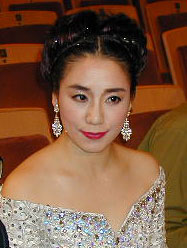Chon Wolson
Chon Wolson | |
|---|---|
 Chon in 2000 | |
| Born | 1958 (age 65–66) |
| Korean name | |
| Hangul | 전월선 |
| Hanja | 田月仙 |
| Revised Romanization | Jeon Wolseon |
| McCune–Reischauer | Chŏn Wŏlsŏn |
| Japanese name | |
| Kanji | 田 月仙 |
| Katakana | チョン・ウォルソン |
| Romanization | Chon Woruson |
Chon Wolson (born 1958) is a soprano opera singer in Japanese-born Korean and a member of the Nikikai Opera Company.[1] Born in Tokyo, she is a second-generation Korean.
Career[edit]
In 1985, Chon Wolson sang the leading part in two operas - Poulenc's La voix humaine and Ravel's L'heure espagnole . She later went on to sing leading parts in The Marriage of Figaro (Mozart), The Turn of the Screw (Britten), Pagliacci (Leoncavallo), Madama Butterfly (Puccini), Salome (Richard Strauss), Carmen (Bizet), and La traviata (Verdi).
In 1985, she gave a solo vocal performance in Pyongyang, North Korea. In 1994, she performed the title role in Carmen (director: Flavio Trevisan) in the Seoul Opera House, South Korea.
She became the first singer in decades to sing songs in Japanese during an event commemorating the Tokyo-Seoul Sister City 10th Anniversary in the South Korean capital, where Japanese songs were prohibited.
In 2002, Japan and South Korea co-hosted the 2002 FIFA World Cup, and Chon appeared in such events as the "Japan-Korea Friendship Concert" (Suntory Hall, Tokyo); the Japan and Korea gala concert "Crossing the Sea" (Tokyo Opera City), Japan-South Korean joint opera Chun Hyangjeon, singing the national anthem before the match and at the welcome of South Korean President Kim Dae-jung organized by Prime Minister Junichiro Koizumi at the Prime Minister's Official Residence.
In 2004, marking the 20th anniversary of her debut, a special 90-minute-long program titled "The diva who crossed the strait – 20 years of the Korean singer in Japan", featuring Chon's career, was broadcast on the Japanese national broadcasting station NHK. "The diva who crossed the strait" won the 13th Shogakukan (Japan) non-fiction grand prize in 2006.
Chon sings Love of Country, which is an appeal for peace between the North and South. Documentary programs created about these concerts were broadcast on the South Korean national TV KBS on "Sunday Special" as well as in Japan. In 1996, Chon sang Love of Country on South Korea's New Year's Eve program, marking the first time the program featured a live performance. Later, she gave recitals in several South Korean cities.
Personal life[edit]
Chon was born in 1958 in Tachikawa, Tokyo, Japan.[2][3] She graduated from the Toho Gakuen School of Music.[4]
Chon's four brothers were participants in the 1959–1984 repatriation program sponsored by Chongryon in the late 1960s, and fell victim to purges of Zainichi Koreans by Kim Il Sung. Her second brother died in a concentration camp in 1970; the other three were released in 1978. The three surviving brothers met Chon during the 1985 Pyongyang performance, but as a result of the stress placed on them during the meeting, she refused further performances in North Korea. After her mother died in 2005 she published a book in December 2006 titled "Kaikyo no Aria" ("Aria over the Strait)", her memoirs.[5][6]
References[edit]
- ^ "南과 北 그리고 일본… '해협의 아리아' 눈물 30년" (in Korean). 주나고야총영사관. 22 August 2013.
- ^ "祖国に、ウクライナに届け、平和の歌 在日オペラ歌手・田月仙さんが「トスカ」公演に込める思い". Tokyo Shimbun. 6 September 2022. Retrieved 22 September 2023.
- ^ "きらりすと". Tokyo Broadcasting System. 26 April 2000. Retrieved 22 September 2023.
- ^ "'고려산천…'부활시킨재일동포 가수전월선씨(한겨레가 만난사람)". The Hankyoreh (in Korean). 6 December 1996. Archived from the original on 10 May 2023. Retrieved 10 May 2023.
- ^ Matsubara, Hiroshi (20 January 2007), Japan's Korean Residents Caught in the Japan-North Korea Crossfire, retrieved 30 March 2017
- ^ Ryang, Sonia (2008). Writing Selves in Diaspora: Ethnography of Autobiographics of Korean Women in Japan and the United States. Lexington Books. p. 71. ISBN 9780739129029.
External links[edit]
- Chon Wolson Official Website (in Japanese, Korean and English)
- Internet Archive of Chon Wolson
